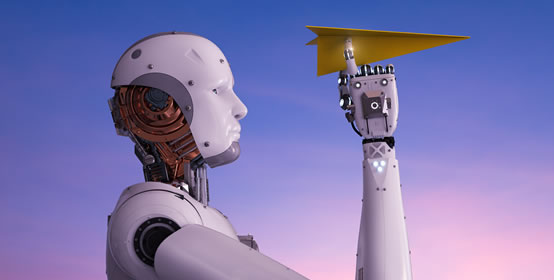
Artificial intelligence or AI is now being utilized in a variety of industries across the globe. It particularly is making its mark in the aviation industry as airline companies continue to experiment with how AI can make flying faster, safer, and more convenient. While these experiments are in the earliest phases right now, they are showing promise that could allow AI to have a solid future in tomorrow's aviation industry.
By all accounts, the global aviation industry is growing at an unprecedented pace. Within the next few years, passenger counts are expected to double. This increased demand could put a strain on the systems that are in use today at airports across the globe.
With AI, however, the demand could be easily met without putting additional strain on an airliner's operations or budget. It also could satisfactorily maintain and control important facets of this industry including keeping track of safety records, keeping down costs, increasing customer satisfaction, and generating more revenue.
Artificial intelligence is already being used in select airports to identify passengers and handle ticketing matters. In fact, it has proven itself capable of performing end-to-end passenger identification and check-in functions at the airport.
Some airports are already using AI in ticketing kiosks that allow passengers to check in quickly without having to wait in long lines. It also is being used by some airliners in mobile apps that allow passengers to check in for flights from the touch of a smartphone or tablet computer.
Further, AI is expected to be in use soon for the purpose of self-service flight check-in. Customers will use this technology in kiosks that will feature facial recognition. It is expected to facilitate faster check-ins and speed up customer flow at the airport while also improving customer satisfaction.
AI will also prove critical in the process of screening customers' baggage. With AI, customers can have the size of their baggage determined before they even arrive to the airport and check in for a flight. They can additionally use a mobile app to prepay for any baggage-related expenses.
One of the most frustrating aspects of flying for many customers is getting assistance with commonly asked questions or concerns. Customers either have to wait in line at the airport or call and then await on hold for long minutes before they can reach a live agent for help.
These old ways of getting help with questions and concerns could soon go by the wayside in favor of AI. With AI, customers could soon use technology like Amazon Alexa that can be paired with an airliner's mobile app. Alexa can then be used to:
Customers will no longer need to call a customer service number or wait in line at the check-in counter at the airport to speak with a live person. They will get information at their fingertips using AI.
Finally, AI could soon be used to maintain and repair airplanes. Experiments are already underway to determine how well AI can optimize maintenance planning and capacity of airliners.
It is showing promise in being able to reduce the need for routine maintenance by triggering repairs only as they are needed. Further, AI can increase an airliner's fleet availability by up to 35 percent, all the while reducing labor costs by as much as 10 percent.
It can also predict potential issues with airliners by using data from in-service aircraft. AI will be able to use algorithms to predict flight delays and faults with airplanes. As a result, it could allow both airliners and airports a better chance of avoiding serious issues that could disrupt traffic, revenue, and customer satisfaction.
Artificial intelligence could soon transform the way that airliners operate and serve customers. It could facilitate faster check-ins and allow customers to handle many of their own flight-related issues like checking in and paying for baggage-related costs. AI also can keep more airliners in the sky and reduce a company's repair and labor costs.